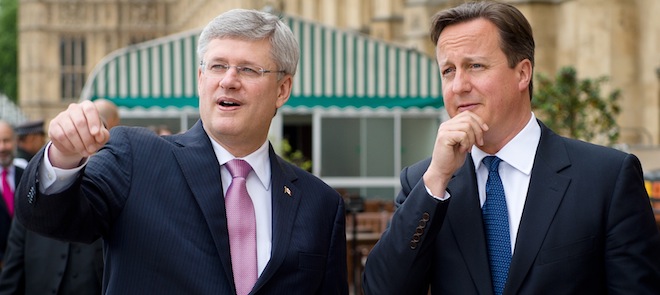Don’t count Stephen Harper out
Come-from-behind conservative wins in the U.K. and Israel suggest it would be unwise to count Harper out
British Prime Minister David Cameron, right, talks with his Canadian counterpart Stephen Harper ahead of Prime Minister Harper’s address to the House of Commons in central London, Thursday June 13, 2013. (AP Photo/Leon Neal, Pool)
Share

Is Stephen Harper taking notes from conservative politicians in other counties who have pulled off improbable victories when defeat seemed certain?
Harper seems to be running a multi-leveled campaign. Still present is the calm, rational and reassuring persona the Prime Minister has perfected over his time in office. You get the feeling he wouldn’t lose his temper if someone spit water in his face.
But he’s also running on fear—fear of what a victory by one of his opponents might mean, and the fears of some Canadians about the supposed encroachment of radical Islam.
Harper says his opponents are the ones who have made an issue of his government’s belief that during citizenship ceremonies a woman should not be permitted to wear a niqab—a face veil worn by a tiny minority of Muslim women in Canada. But the Conservatives have run at least one attack ad pillorying Liberal leader Justin Trudeau’s stance opposing that. Harper has also publicly mused about forbidding public servants from wearing the niqab. (If there’s a single civil servant who wears one now, journalists have been unable to find her.) And the Conservatives have pledged to establish a “barbaric cultural practices” tip line, which would admittedly be a handy initiative for those who find 9-1-1 too hard to remember.
As for a Liberal victory, according to recent Conservative ads in Punjabi and Chinese, Liberals want to open brothels “in your neighbourhoods.” The ads also say the Liberals want to legalize marijuana, which the ads claim would allow children easier access to the drug.
The Liberals do want to legalize marijuana for people over the age of 18 and regulate it, which they say would restrict access for children. The Tories’ claim that Liberals want to open neighbourhood brothels is tenuously based on Liberal leader Justin Trudeau voting against anti-prostitution bill C-36.
The Conservative strategy is divisive and populist. But comparable ones elsewhere have had some success.
[widgets_on_pages id=”Election”]
British Prime Minister David Cameron looked headed for defeat in a general election this spring. Like Harper, Cameron preached economic stability. The country’s financial recovery is fragile, he said, and only by staying the course could Britons ensure it continues. But Cameron also stoked fears among voters, warning of an outcome in which the Labour party formed a minority government with support from the separatist Scottish Nationalist Party. A referendum on Scottish independence had been defeated the previous year.
The SNP did indeed all but sweep Scotland and would have been a powerful voice in a Parliament led by a minority Labour government. But it didn’t matter—Cameron shocked pollsters and analysts by winning his first majority.
Israel’s Prime Minister Benjamin Netanyahu took things much, much further during his campaign for re-election earlier this year. He labeled his main opposition, a joint list of candidates from the Labour and Hatunah parties that called itself the Zionist Camp, the “anti-Zionist camp.”
Zionism, broadly speaking, refers to the belief that Jews should have a national homeland in Israel. Netanyahu was coming close to accusing his centre-left opponents of treason.
Then, on election day, Netanyahu warned that “Arab voters are going to the polls in droves,” as if Israeli Arab citizens exercising their democratic rights was a calamitous event to be feared and confronted. Israel’s right rallied to Netanyahu, and he, too, won an election many predicted he would lose.
Will Harper’s wedge-driving politics allow him to reverse a slide in the polls and hold on to power? Counterintuitively, perhaps, Liberal polling gains may not be all bad news for the Tories. Faced with a similar situation only days before the Israeli election, top Netanyahu strategist Aron Shaviv decided to capitalize on Netanyahu’s precarious position, according to reporting by the Wall Street Journal. Instead of projecting public confidence, Netanyahu’s camp emphasized how vulnerable his right-wing Likud party was. The tactic became known as the oy gevalt gambit, referring to the Yiddish expression for “woe is me.”
The idea was to clarify in the minds of voters the very real dangers of a Likud defeat. For Israel, according to the spin, this would mean a leftist takeover.
For Canada, the risks are niqabs, stoned children and prostitutes everywhere. Or maybe stoned prostitutes wearing niqabs. In your neighbourhoods. Woe is us.